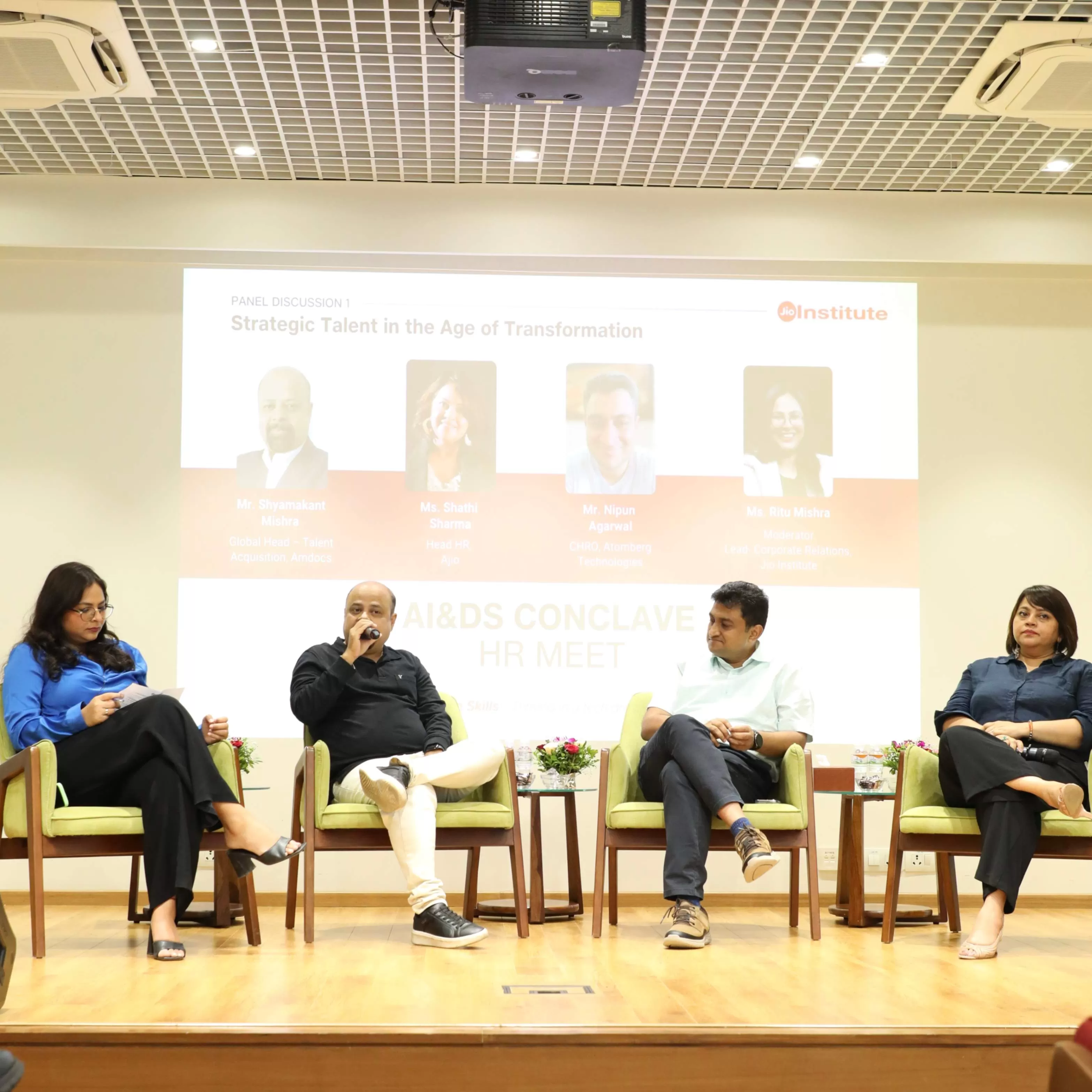AI & DS Conclave: Future Skills:-Thriving in a Tech-Driven World


Context
"The war of talent is at its peak" - a reality that defined the AI & DS HR Conclave 2025 at Jio Institute, where industry leaders revealed that 60-70% of future workforce needs will be met through internal talent marketplaces rather than external hiring. Under the theme "Future Skills: Thriving in a Tech-driven World," leading HR professionals discussed the fundamental shift from role-based to skill-based hiring while navigating the complexities of managing Generation Z expectations in an increasingly technology-driven world. The conclave, held on 18th July, was joined by 44 HR professionals from across industries, along with Jio Institute PGP students, faculty members and staff.
Strategic Talent in the Age of Transformation
The first panel featured senior HR leaders discussing the fundamental shifts in talent strategy as Generation Z, on the back of generative and agentic AI, enters the workforce in large numbers. The discussion delved into how AI is being used effectively in hiring practices, however, the focus for recruiters is the attitude and willingness to learn amongst the candidates.
Adapting to Gen Z Expectations
Ms. Shathi Sharma, Head HR at Ajio, emphasized the evolution from traditional competency frameworks: "Hire for the attitude and upgrade the skills" has become their new mantra as consumer requirements change rapidly, necessitating project-based integration in hiring practices.
Mr. Nipun Agarwal, CHRO at Atomberg Technologies, highlighted transparency as crucial for Gen Z engagement: "Transparency is the key with Gen Z, they need to know exactly where they stand, whether be it in terms of CTC breakdowns or performance evaluations." He noted that corporate competency frameworks have struggled to evolve with changing expectations.
The War for Talent
Mr. Shyamkant Mishra, Global Head-Talent Acquisition at Amdocs, with more than 20 years of recruitment experience, observed that "the war for talent is at its peak" in the post-COVID era. He emphasized the critical need to help candidates "find their purpose" especially in technology schools, aligning individual vision with organizational impact.
Technology-Driven Hiring Strategies
The discussion revealed how organizations are leveraging AI and data analytics to transform their hiring approaches. Mr. Shyamkant talked about the comprehensive "4Bs framework" for workforce planning:
- Buy (external hiring)
- Borrow (contractual hiring)
- Build (upskilling and cross-skilling)
- Bound (internal promotions and leadership tracks)
Mr. Shyamkant explained: "We use AI to evaluate the 4Bs for each of the projects, which helps us make better decisions" as hiring shifts from role-based to skill-based approaches.
Diversity and Inclusion
Ms. Shathi mentioned that Ajio has achieved 40% gender diversity overall, though senior female leadership representation remains at 15%. Both Ajio and Amdocs have launched programs supporting women's career continuity, including "Second-Innings" and "Relaunch" initiatives for professionals returning after career breaks.
Workforce Planning Evolution
A critical insight emerged regarding traditional workforce planning cycles. With technology changes occurring every six months while organizations plan for 3-5 years, panelists advocated for more agile approaches. Ms. Shathi noted that "60-70% will come from the talent marketplace" referring to internal talent pools, while organizational structures change weekly to maintain nimbleness.
Building Culture and Agility for the Future
The second panel focused on creating resilient organizational cultures and developing essential skills for future success.
Managing Volatility in Dynamic Industries
Mr. Abhishek Gupta, Head HR at Zebpay, addressed working in the volatile cryptocurrency sector: "For our field, volatility is not a perk, but a disabler. Hence, we need to create an environment which is agile." Zebpay implements the "OHANA" (Hawaiian for Family) concept, ensuring "You are okay to trip and fall, but not alone".
Purpose-Driven Work Culture
Mr. Adhir Mane, CHRO-Corporate at Raymond Limited, quoted Nietzsche: "If you know the why, you can live the how," emphasizing that understanding organizational purpose beyond financial metrics drives meaningful engagement and resilience.
Essential Campus Hiring Criteria
The panelists identified key attributes for new graduates:
Mr. Shivadeep Panjwani, National Head-HR, Bajaj Finserv emphasized three critical factors: "adaptability, attitude, and passion. Skills can be built from within, and not overnight."
Ms. Shikha Bhatnagar, HR Director, Noventiq highlighted the strategic role of HR analytics: "Data-rich and data-driven insights in HR is helping us bring in strategic business decisions to the table," particularly in employee engagement and wellness gap identification.
Key Takeaways for Future-Ready Organizations
The conclave revealed several crucial trends shaping the future of HR:
- Attitude & agility is what recruiters seek from talent in today’s rapidly evolving workplaces
- Skill-based hiring is replacing traditional role-based recruitment
- AI and analytics are enabling more strategic workforce decisions while preserving human judgment in final selections
- Transparency and purpose have become non-negotiable for Gen Z talent retention
- Agile workforce planning with quarterly cycles is replacing annual strategic planning
As organizations navigate rapid technological change, the consensus emerged that success depends on balancing AI-enabled efficiency with human-centered culture building. The conclave demonstrated that while technology transforms how we work, the fundamental need for purpose, transparency, and adaptability remains uniquely human.
The event concluded with recognition that institutes like Jio Institute, offering specialized AI & Data Science courses, play a crucial role in building the talent pipeline for this tech-driven future, providing organizations with the intellectual capital needed to thrive in an era of continuous transformation.
